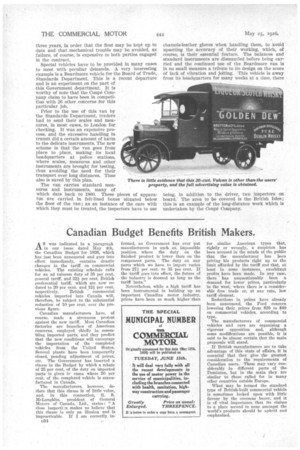Canadian Budget Benefits British Makers.
Page 18

If you've noticed an error in this article please click here to report it so we can fix it.
AS was indicated in a paragraph in our issue dated May 4th, the Canadian Budget for 1926, which has just been announced and goes into effect immediately, contains drastic changes in the tariff on commercial vehicles. The existing schedule calls for an ad valorem duty of 35 per cent. general tariff, and 2211 per cent. British preferential tariff, which are now reduced to 20 per cent. and 121r per cent.
respectively. British s commercial vehicles imported into Canada will, therefore, be subject to the substantial reduction of 10 per cent, over the previous figure.
Canadian manufacturers have, of course, made a strenuous protest against the new tariff. Most Canadian factories are branches of American concerns, employed chiefly in assembling imported parts, and they predict that the new conditions will encourage the importation of the completed vehicles from the 'United States. Several plants have been temporarily closed, pending adjustment of prices, etc. The Government has inserted a clause in the Budget by which a rebate of 25 per cent, of the duty on imported pup is given ir cases where 50 per cent, of the completed vehicle is manufactured in Canada.
The manufacturers, however, declare that this clause is of little value, and, in this connection, R. S. McLaughlin, president of General Motors of Canada, Ltd., states : "A close inspectim makes us believe that this clause is only an illusion and is impracticable. If I am correctly in
c34 formed, no Government has ever put manufacturers in such an impossible position where the duty on the finished product is lower than on the Component parts. The duty on any parts which we have to import varies from 27i per cent. to 35 per cent. If the tariff goes into effect, the future of the industry is doomed as long as the tariff lasts."
Nevertheless, while a high tariff has been instrumental in building up an important Canadian motor industry, prices have been so much higher than for similar American types that, rightly or wrongly, a suspicion has been aroused in the minds of the public that the manufacturer has been pricing his products right up to the limit afforded by the tariff and that, at least in some instances, exorbitant profits have been made. In any ease, there has unquestionably been a demand for lower prices, particularly in the west, where there is a considerable free trade or, at any rate, low tariff element.
Reductions in prices have already been announced, the Ford concern lowering their prices from $20 to $40 on commercial vehicles, according to type.
The manufacturers of commercial vehicles and ears are organizing a vigorous opposition and, although some modifications are possible, it is said to be almost certain that the main proposals will stand.
If British manufacturers are to take advantage of this state of affairs, it is essential that they give the greatest consideration to the requirements of Canadian users. These may vary considerably in different parts of the Dominion, but in the main they are similar to those called for in many other countries outside Europe.
What may be termed the standard type of British-built commercial vehicle is sometimes looked upon with little favour by the overseas buyer, and it is of vital importance that its claims to a place second to none amongst the world's products should be upheld and emphasized.


























































